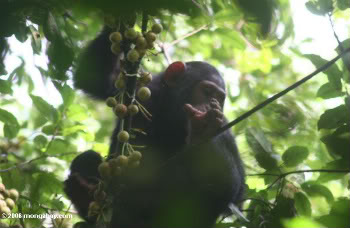Male chimpanzees who share meat with females over a long period of time have a better chance of mating, according to a new study published in PLoS ONE.
Studying chimps in Tai National Park, Côte d’Ivoire, researchers from the Mac Planck Institute for Evolutionary Anthropology observed that female chimps have sex more frequently with males who have shared meat with them at least once as opposed to males who never share.
“Our results strongly suggest that wild chimpanzees exchange meat for sex, and do so on a long-term basis,” said Cristina M. Gomes, one of the researchers. “Males who shared meat with females doubled their mating success, whereas females, who had difficulty obtaining meat on their own, increased their caloric intake, without suffering the energetic costs and potential risk of injury related to hunting.”
 Wild chimpanzee in Uganda. Photo by: Rhett A. Butler. |
Males were also found to be more likely to share meat with female chimps in heat, evidenced by swelling in her genitals. However, the results of the study were not altered when such occurrences were excluded from the data, leading the researchers to believe that the male chimps often thought in the long-term by sharing meat with females not yet in heat.
“Our findings add to the ever-growing evidence suggesting that chimpanzees can think in the past and the future and that this influences their present behavior,” said Christophe Boesch, one of the researchers. Scientists recently announced unambiguous evidence for long-term planning in chimpanzees from studying a chimp in a zoo who carefully collected stones to throw at visitors at a later time.
Trading meat for sex may not be unique to chimps. Similar studies have been conducted on humans in hunter-gatherer societies, where it was found that the most successful hunters had the most wives and children.
“These findings are bound to have an impact on our current knowledge about relationships between men and women;” says Gomes, “and similar studies will determine if the direct nutritional benefits that women receive from hunters in human hunter-gatherer societies could also be driving the relationship between reproductive success and good hunting skills.”
Related articles
Dedicated rock-throwing chimp proves longterm planning
(03/10/2009) Biologists have suspected for a long time that animals other than humans are capable of making plans for future events, but it has proven difficult to show conclusively. However, a new study in Current Biology claims the first unambiguous evidence of an animal premeditating. Mathias Osvath of Lund University in Sweden has spent a decade observing a male chimpanzee in a zoo collecting stones, making them into concrete discs, and then throwing them at zoo visitors.
Cote d’Ivoire endangered chimp population falls 99% since 1960
(10/14/2008) The population of West African chimpanzees living in Cote d’Ivoire has collapsed due to hunting and forest destruction, report scientists writing in the October 14th issue of Current Biology.
Rwanda launches reforestation project to protect chimps, drive ecotourism
(03/17/2008) conservationists in Rwanda have launched an ambitious reforestation project that aims to create a forest corridor to link an isolated group of chimpanzees to larger areas of habitat in Nyungwe National Park. The initiative, called the Rwandan National conservation Park, is backed by the Rwandan government, the Great Ape Trust of Iowa, and Earthpark, a group seeking to build an indoor rainforest in the U.S. Midwest.
Dirt-munching helps protect chimps from malaria
(01/10/2008) Soil ingestion helps chimps protect themselves from malaria, reports a new study published in the journal Naturwissenschaften. Apparently geophagy, as the deliberate behvaior is known, increases the potency of ingested plants with anti-malarial properties.
Chimps and humans split 4 million years ago
(02/23/2007) New research using DNA analysis suggests that chimpanzees and humans split from a common ancestor just 4 million years ago — much earlier than the 5-7 million years currently accepted by biologists. The study is published in Public Library of Science journal PLoS Genetics
Chimps hunt bush babies with spears
(02/22/2007) Researchers have observed wild chimpanzees in Senegal hunting bush babies with spears, according to a paper published in the March 6 edition of the journal Current Biology. The study is the first to report primates using tools for hunting other vertebrates.
Captive chimpanzees ‘talk’ to humans
(01/29/2007) Captive chimpanzees use specific vocalizations to communicate with humans according to new research published in the current issue of the journal Animal Behaviour. The researchers, lead by Dr. William Hopkins of Yerkes National Primate Research Center at Emory University, say these sounds are not used in other contexts — only to elicit attention from humans. The researchers say the findings may help explain the evolution of language in primates.














